“True beauty comes from within.”
That’s how the saying goes, and in reality, it rings true in a far more literal sense than it was maybe intended.
You see, beauty is dependent on health.
When you look after your insides, there are direct benefits for your external features like skin, hair, and nails (and it keeps your bones healthy too!) And for healthy insides, you need to feed your body all the nutrients it needs.
Optimal nutrition only becomes more important as you get older too. If you lack key nutrients, you can experience:
- Premature aging
- Poor skin quality
- Lusterless hair (or even alopecia)
- Weak, spotted nails
- A dysfunctional metabolism
- Bone loss
Now, we don’t claim to have the elixir of youth… but what we do have for you is 8 science-backed vitamins and minerals to support your overall health and beauty.

8 Science-Backed Beauty-Boosting Vitamins and Minerals
Flavonoids
What are they?
Ok, they may not be vitamins or minerals, but they’re great for your beauty! Flavonoids is the umbrella term given to a group of thousands of phytonutrients (plant chemicals) present in nearly all plants. In fact, flavonoids, along with carotenoids, are responsible for the color of fruit and vegetables.
How are they beneficial to beauty?
Every plant contains a unique combination of flavonoids, which explains why there are so many known benefits. They include the prevention or delay of; cancer, cardiovascular diseases, arthritis, aging, cataract, memory loss, stroke, Alzheimer’s disease, inflammation, and infections.
But most of the documented benefit of flavonoids can be attributed to their potent antioxidant properties. Antioxidants counteract oxidative stress.
When your cells use oxygen to generate energy, they create free radicals as a by-product. Now, at low levels, free radicals are actually beneficial to your health. They support immune function and cellular response. But when your level of free radicals is too high, they begin to generate oxidative stress.
And oxidative stress is very bad news. It can damage all of your cell structures, which is thought to accelerate the aging process! And it gets worse. Oxidative stress also plays a role in the development of:
- Cancer
- Arthritis
- Autoimmune disorders
- Cardiovascular disease
- Chronic inflammation
That last one on the list there ─ chronic inflammation ─ can cause itchy skin, redness, dermatitis (eczema), rosacea, seborrheic dermatitis, and psoriasis.
And it has some seriously negative implications for your bone health too. Chronic inflammation stimulates the activity of your osteoclast cells. And they’re the cells that break down your bones! If it goes unchecked, inflammation can even lead to osteoporosis.
What are the best sources?
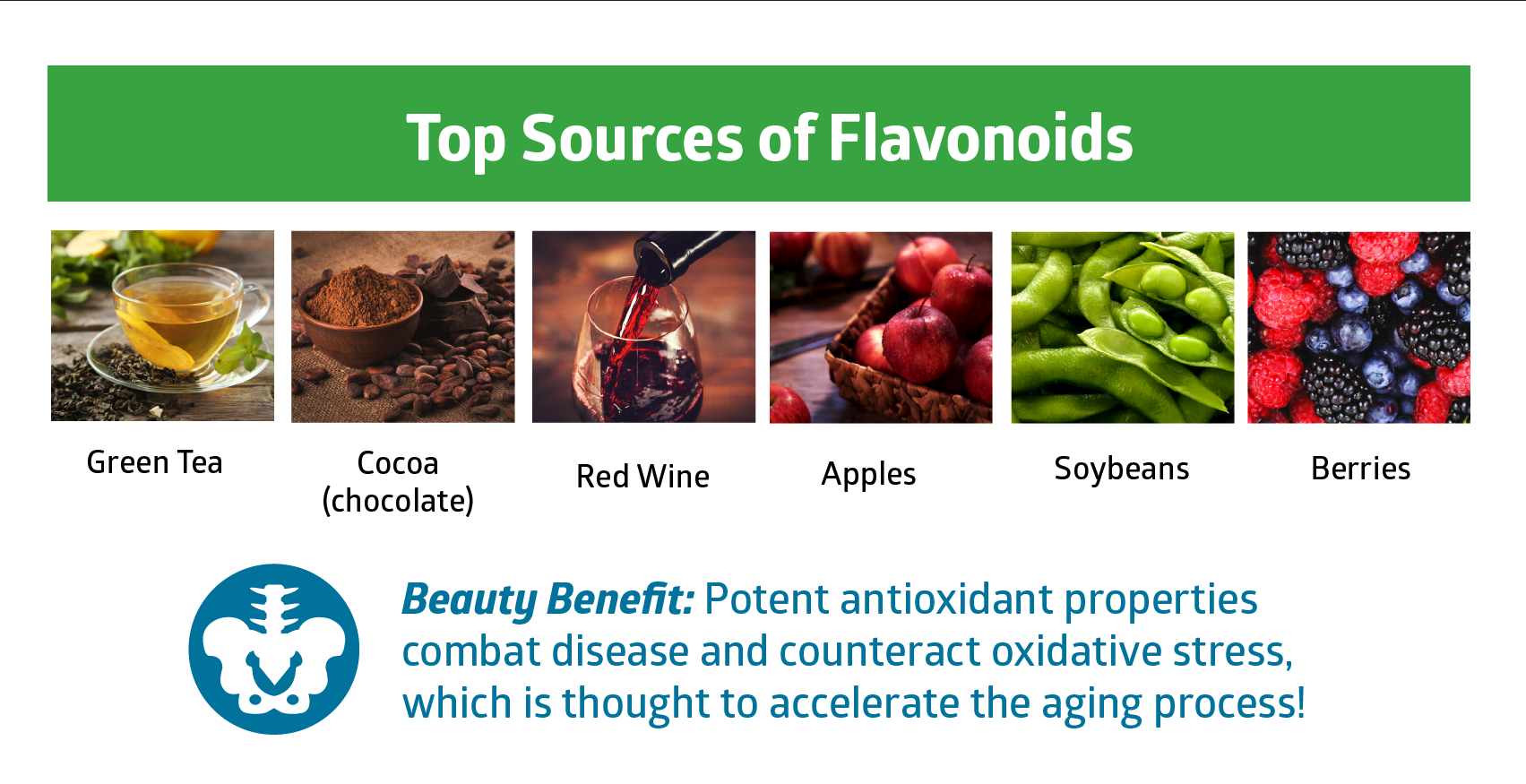
As we mentioned, there are thousands of flavonoids. So that means that there are a LOT of sources to get them from too. But the most common (and easiest to add to your diet) include:
- Green tea
- Red wine
- Apples
- Cocoa (chocolate)
- Soybeans
- Berries
Silicon
What is it?
Silicon is the second most abundant element on earth, behind only oxygen. And it’s the third most abundant trace element in your body. Fun fact: silicon is the primary component of your nails!
How is it beneficial to beauty?
Silicon is a beauty all-rounder. It has beauty-boosting benefits for your skin, hair, and nails! And if that wasn’t already enough, silicon is a bone-health superstar too!
Strong, wrinkle-free skin: After you turn 21 years-old, you lose 1% of the collagen in your skin every year. That means your skin is becoming thinner, which amplifies the depth and appearance of wrinkles. And it gets even worse for women….a woman loses about 30% of her skin collagen in the first five years after menopause! Plus she’ll lose an annual 0.55% of her skin elasticity post-menopause too.
The good news is that silicon plays an important role in the synthesis of collagen. Silicon also activates hydroxylation enzymes, which help to form the collagen network. What that means, is that silicon is essential for improving the strength and elasticity of skin, and reducing the appearance of deep wrinkles.
Brighter, fuller hair: Do you find yourself with strands of hair in your hands every time you wash your hair? Well, silicon could help you with that.
A randomized study investigated the effect of a bioavailable form of silicon on hair. Forty-eight volunteers with thin hair took part in the study. They were divided into two groups: one which received a daily, oral silicon supplement for nine months, or one which received a placebo for the same time period. The morphology and mechanical properties of hair were evaluated at the beginning and the end of the study.
The results showed that the silicon group saw a far lower decrease in the elasticity and break resistance of their hair compared to the control group. Plus, the area of the strand front section increased significantly after nine months of supplementation, while the placebo group showed no significant difference.
Strong nails: As we mentioned earlier, silicon is the primary component of your nails. Now, as silicon is the third most abundant trace mineral in the human body, it’s rare to be outright deficient. But less than optimal levels can lead to brittle and cracked nails.
Research shows that supplementing additional silicon may not be able to improve the health of already healthy nails further. But a daily dose of 10 mg of silicon can reverse brittle nail syndrome.
Bonus bone-health benefits:
Silicon offers a rare dual benefit for your bones. It stimulates the cells that build new bone- the osteoblasts. And it also inhibits the cells that break down bone- the osteoclasts!
That adds up to an increased bone mineral density. A theory confirmed by the Framingham Offspring Cohort Study. The population-based study examined the association between silicon intake and bone mineral density (BMD) in 1,596 participants.
Silicon intake correlated positively with BMD at four hip sites in men and premenopausal women. (Although there was no significant change in postmenopausal women.) What’s more, a silicon intake of more than 40 mg a day produced a BMD increase of up to 10% more than a silicon intake of 14 mg a day or less.
What are the best sources?
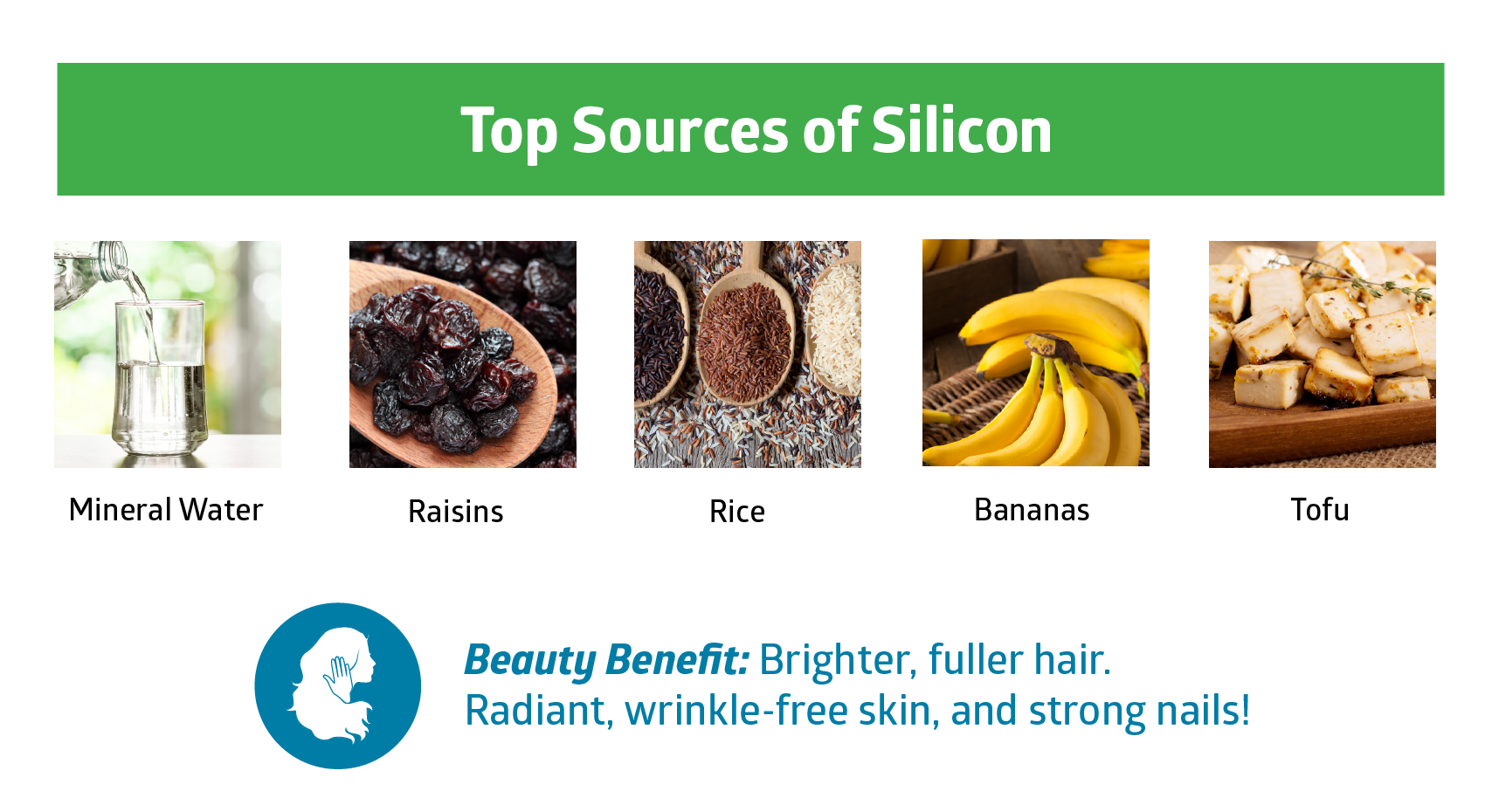
If the benefits of silicon weren’t compelling enough, you might be interested to hear the best dietary source is beer! It’s thanks to the barley and hops used in the brewing process. Cheers silicon! (If you want to learn more about the silicon content of beer, including the specific type of beer with the most silicon, check out our ‘Osteoporosis Diet and Nutrition’ page.)
But for those that don’t drink, or are just interested in alternatives, the other top sources of silicon are:
- Mineral water
- Raisins
- Rice
- Bananas
- Tofu
Did you know? AlgaeCal Plus provides 25.9 mg of silicon in a daily serving (4 capsules). By adding it to your daily routine, along with the rich-food sources above, you should be well on your way to the Recommended Daily Intake of 40 mg per day.
Vitamin K
What is it?
Vitamin K is a fat-soluble vitamin, most commonly known for its effects on blood circulation and clotting.
How is it beneficial to beauty?
Vitamin K can breathe life back into your eyes. After all, your eyes are the telltale sign of aging. You see, the skin around your eyes is very thin, and doesn’t contain much collagen. So it’s prone to lines (think crows feet) and dehydration. And those dark circles? They’re caused by broken blood vessels leaking hemoglobin into the surrounding thin skin.
One study showed that Vitamin K can reduce those dark circles around the eyes in particular. Eleven women volunteers were given a cotton eye pad containing a mixture of vitamin K, caffeine, and emu oil to wear around their right eye for one hour every night for four weeks. They were also given a control pad, containing just water, to wear around their left eye for one hour every night for four weeks. The women were told not to use any other kind of skin product for the duration of the study.
Visual checks and a multi-skin test instrument determined the results of the study. They showed that the eye that had received the eye pad containing vitamin K, caffeine, and emu oil had greatly improved moisturization, elasticity, and a decrease in the pigmentation of dark circles. The control pad only showed minor improvements in each category.
And the researchers concluded that the reduction in dark circles was directly related to vitamin K, “Vitamin K, by strengthening the capillary walls and reducing the visibility of blood vessels through the thin skin under the eyes, can help dark circles to improve prosperity.”
Eleven participants is a small sample group, so we shouldn’t get too carried away with the results. But this study does show great promise and should prompt larger scale studies in the future. But what we do know for certain right now, is that vitamin K (in the form of vitamin K2) is vital for healthy bones….
You know that calcium is the cornerstone of healthy bones, but calcium relies on vitamin K2 and vitamin D too. Vitamin D helps your body to absorb the calcium you consume, and vitamin K2 activates two proteins that regulate where the calcium goes in your body.
- Osteocalcin: Directs the calcium you consume to where it’s needed… your bones!
- Matrix Gla protein: Keeps calcium out of your blood vessels, kidneys, brain, and soft tissues.
You can read more about the teamwork of calcium and vitamin K2 on our ‘Calcium and Osteoporosis’ page.
What are the best sources?
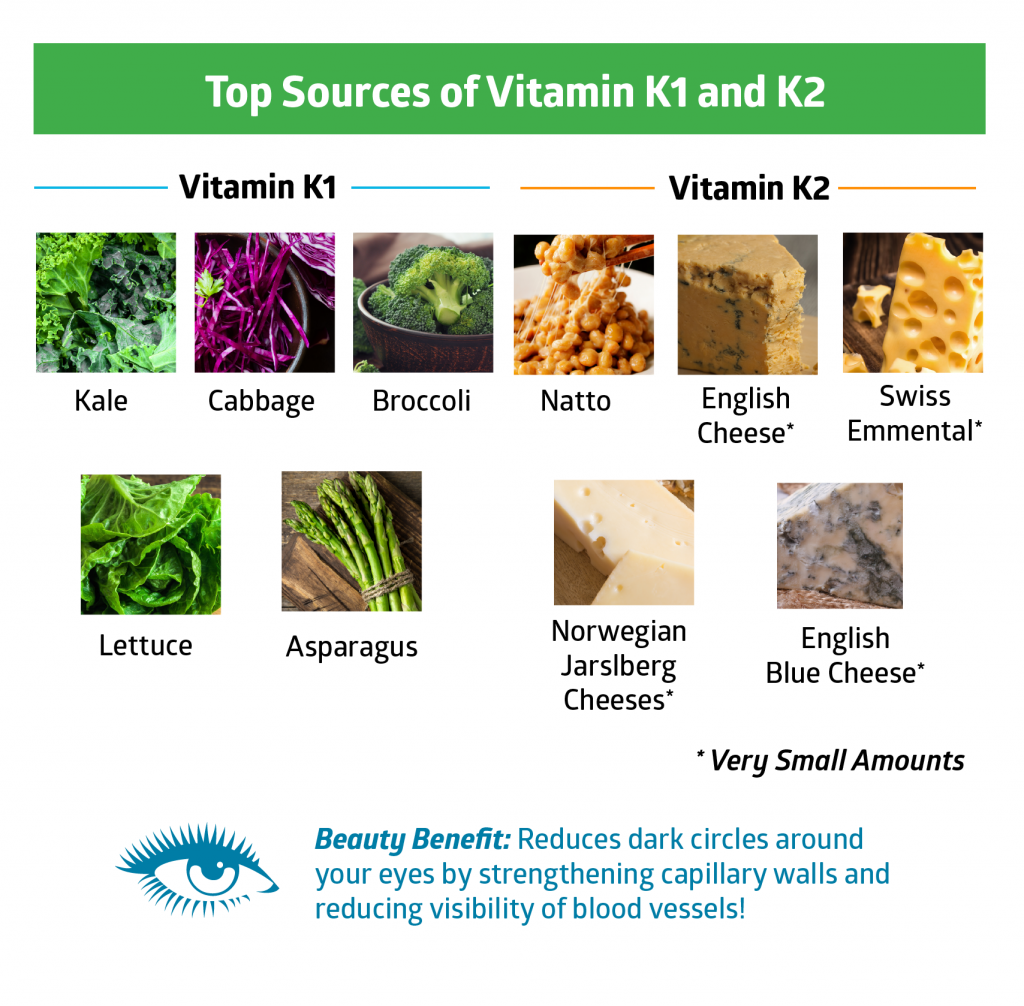
You can find ‘regular’ vitamin K in leafy greens and vegetables like:
- Kale
- Broccoli
- Cabbage
- Lettuce
- Asparagus
But the bone-building vitamin K2 is a little harder to come by. The only food source of vitamin K2 with high enough levels to affect your bones is natto, a Japanese dish of fermented soybeans.
Not only is natto hard to come by in Western supermarkets, it also has an acquired taste too. So your best bet for vitamin K2 is via a supplement. One serving of AlgaeCal Plus contains 100 mcg of Vitamin K2 (more than enough for your daily recommended intake).
Magnesium
What is it?
Magnesium is a chemical element needed for more than 300 biochemical reactions in your body! Did you know that the Dead Sea contains 40x more magnesium than any other body of water on earth? (More on that in just a moment).
How is it beneficial to beauty?
Magnesium helps to relax smooth muscle cells. And smooth muscle cells line the walls of your arteries and veins. What that means in a beauty sense, is that the flow of blood is less inhibited. So your skin, hair, and nails can receive important nutrients more easily.
Magnesium deficiency is also strongly related to chronic inflammation. And we’ve already seen how inflammation can cause undesirable skin conditions like dermatitis (as well as osteoporosis).
Studies have shown that magnesium salts have favorable effects in inflammatory diseases too. One particular study examined the effect of bathing atopic dry skin in Dead Sea water (the Dead Sea has very high levels of magnesium).
Participants with atopic dry skin submerged one forearm in a bath solution containing 5% magnesium-rich Dead Sea salt for 15 minutes a day, for six weeks. The other arm was submerged in tap water as a control. Before, during, and after the study, the transepidermal water loss (TEWL), skin hydration, skin roughness, and skin redness of the participants were recorded.
Bathing in the Dead Sea salt solution significantly improved skin barrier function and skin hydration (compared to plain ol’ tap water). And the roughness and redness of the skin were both greatly reduced too.
What are the best sources?
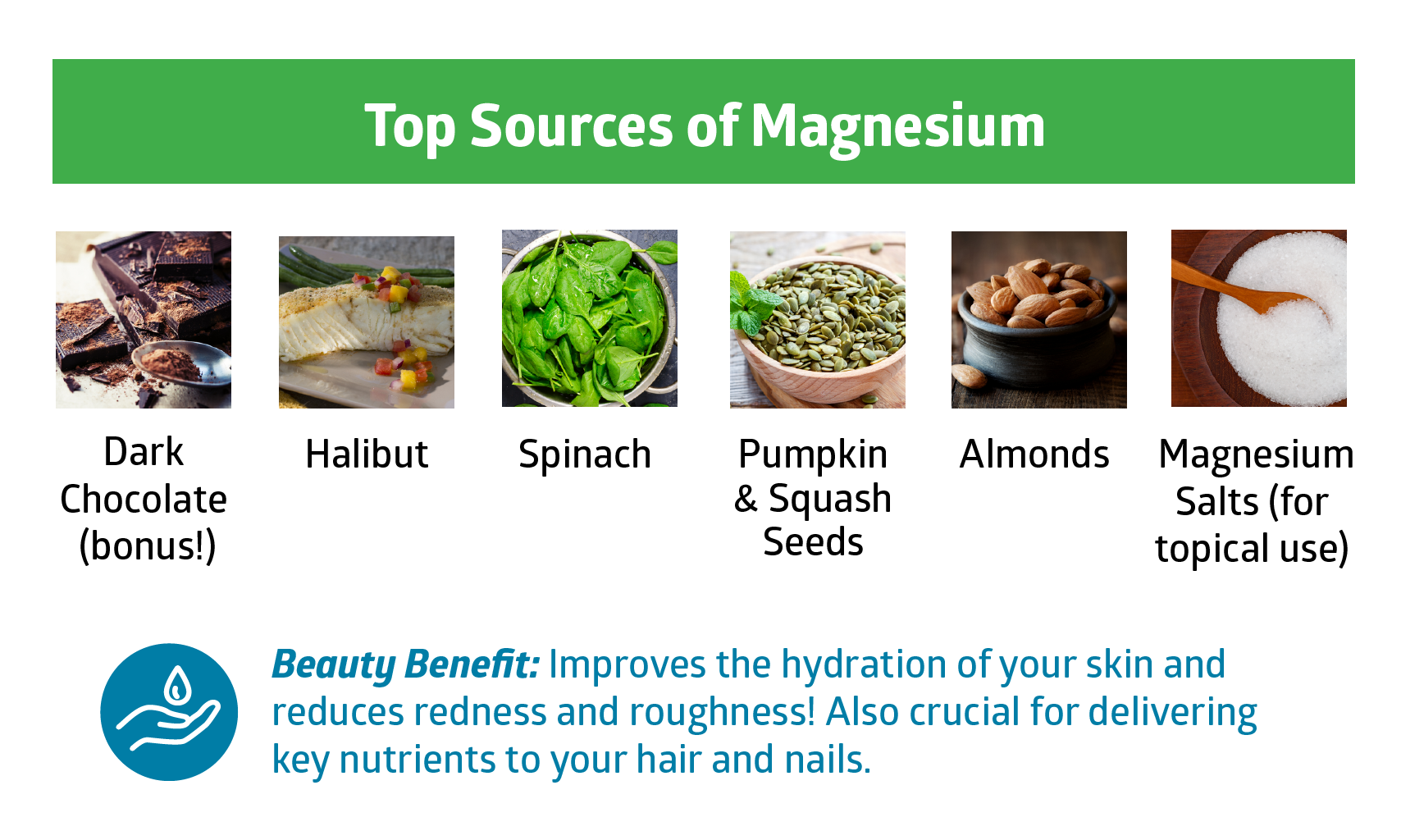
Luckily, you don’t have to travel to the Dead Sea to get sufficient magnesium. You can get it from these top sources:
- Dark chocolate (bonus!)
- Halibut
- Spinach
- Pumpkin and squash seeds
- Almonds
Zinc
What is it?
Zinc is a chemical element that’s abundant in your skin. In fact, of all the tissues in the human body, the skin has the third highest concentration of zinc.
How is it beneficial to beauty?
Zinc is essential for healthy skin. Around 10% of all human proteins bind to zinc, making it vital for cell growth. The highest concentration of zinc is within the epidermis (the outer layer) of skin. Without it, skin cells would not be able to develop or replicate properly, and the barrier between your body and the outside world would be compromised.
A 2011 study showed that zinc man be an effective treatment for localized psoriasis too. 60 patients with localized psoriasis were randomly assigned to one of two groups. Group A was treated with an emollient cream containing zinc twice a day for three months. Group B was treated with emollient cream alone for the same time period.
The extent of the participants’ psoriasis was measured with a PASI (psoriasis area severity index) before and after the treatment was administered. Group A reported a far greater reduction in their psoriasis on average after treatment compared to the control Group B.
Additionally, zinc has antioxidant and anti-inflammatory properties. (Refer back to the flavonoids section if you need a recap of how they’re beneficial for your beauty and overall health).
That helps to explain why people who are zinc deficient are also at a greater risk of developing:
- Dermatitis
- Alopecia
- Acne
- Skin rashes
- Fungal infections
Not an enticing list is it? But zinc deficiency still affects 17% of the world’s population.
What are the best sources?
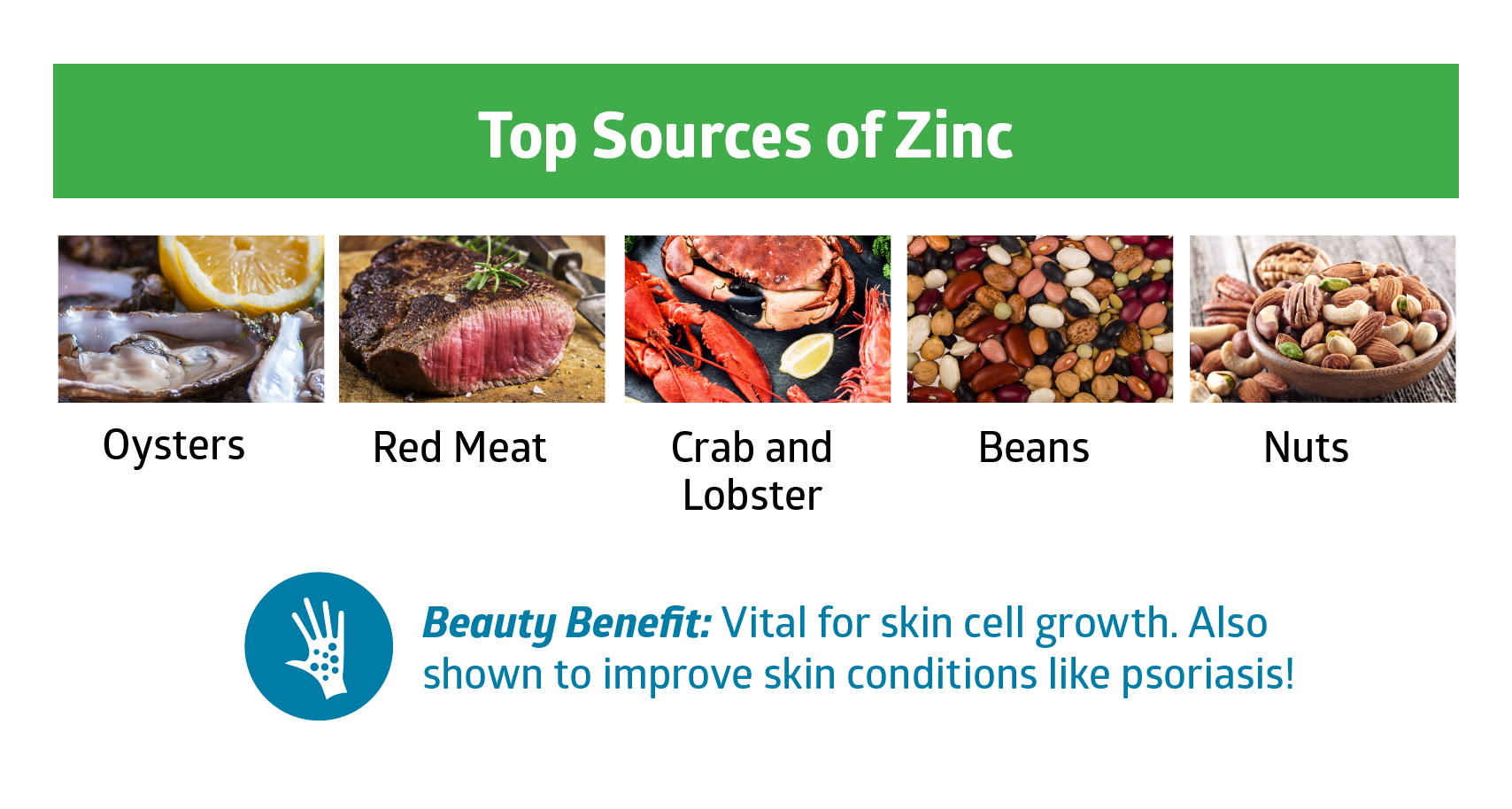
Zinc is present in many food sources, including:
- Oysters
- Red meat
- Crab and lobster
- Beans
- Nuts
Omega 3 Fatty Acids
What are they?
Omega 3 fatty acids are what is meant when you hear the term “healthy fats.” While not classified as a vitamin or mineral, they’re best known for their powerful anti-inflammatory properties which are great for overall health. And they have some skin-specific benefits too!
How are they beneficial to beauty?
As we’ve seen, inflammation is the cause of many health issues. And that includes many skin conditions such as psoriasis, rosacea, and dermatitis. Even temporary conditions like blotchy skin and rashes can be traced back to inflammation.
The omega 3 fatty acids eicosapentaenoic acid (EPA) and docosahexaenoic acid (DHA) in particular, reduce inflammation by blocking the inflammation pathways in your cells. This helps to avoid the onset of the skin disorders mentioned above, and even more serious conditions like skin cancer and osteoporosis.
Omega 3 fatty acids are also important for the epidermal barrier of your skin. The epidermal barrier is located in the most superficial layer of skin and has a dual function. It keeps external toxins and substances from entering your body and keeps water within your skin to keep you hydrated. Now, the bricks and mortar of the epidermal barrier are ceramides, which hold skin cells together. And research has found that EPA’s, in particular, can increase the production of ceramides, keeping skin plumper and more hydrated!
What are the best sources?
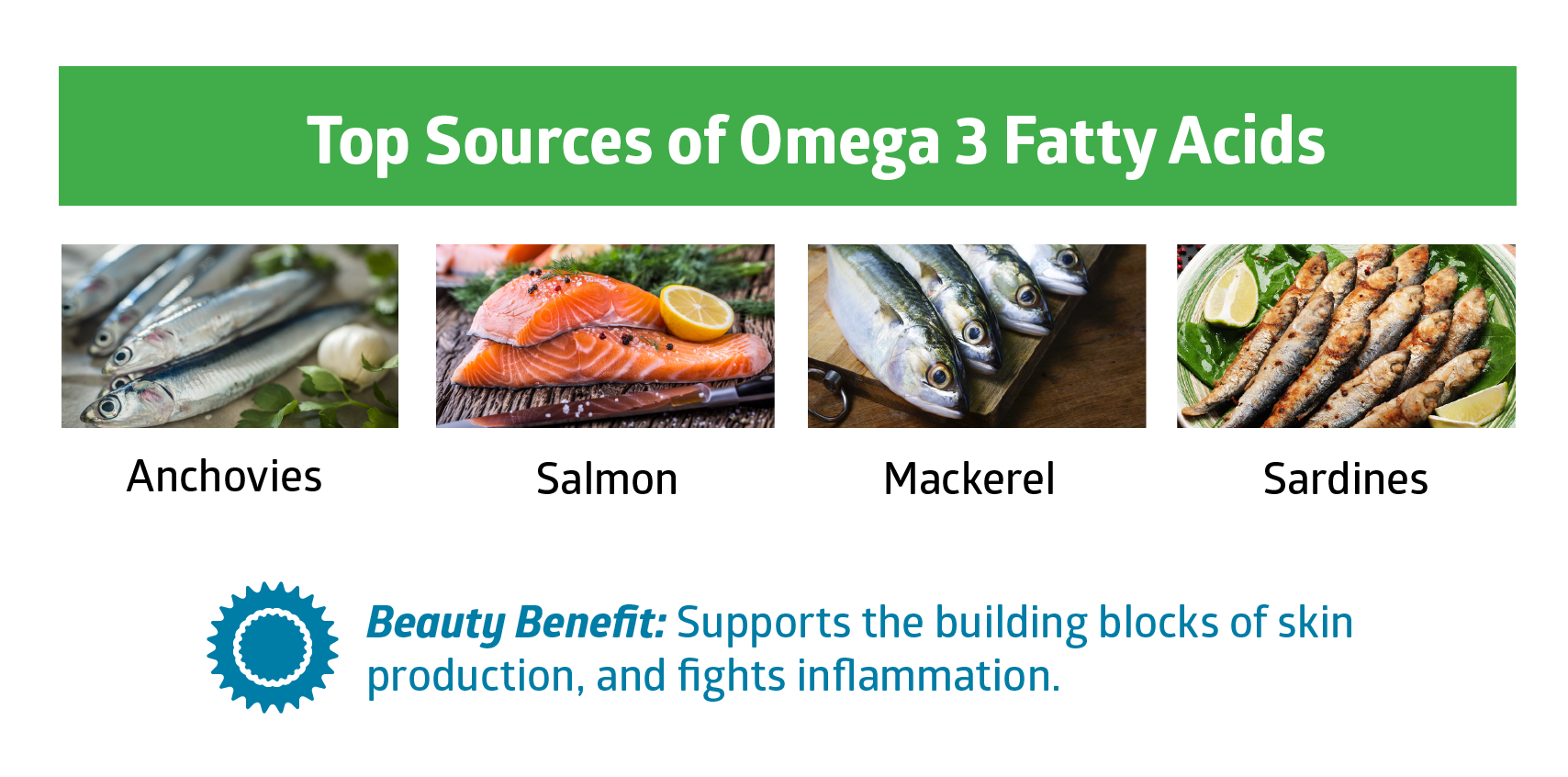
The best source of omega 3 fatty acids is oily fish like:
- Anchovies
- Salmon
- Mackerel
- Sardines
Fish oil supplements are also a great way to get enough omega 3 fatty acids. If you choose the right one that is. Triple Power Omega 3 Fish Oil contains over 1400 mg of omega 3 fatty acids in every serving. And because it’s a liquid emulsion, it’s 300% more absorbable than regular fish oils.
Plus, Triple Power Omega 3 Fish Oil also contains two additional potent anti-inflammatories:
Astaxanthin: Has been shown to significantly lower levels of C-reactive protein, which is a biomarker for systemic inflammation. It’s also what provides the red color in salmon, seafood, and even flamingos. Don’t worry though – it won’t happen to you!
Turmeric curcumin: Many studies have shown that turmeric curcumin is a powerful anti-inflammatory. In fact, one study showed that it’s more potent than Aspirin (like Bayer) and Ibuprofen (like Advil) when it comes to suppressing inflammation!
Vitamin C
What is it?
Vitamin C, also known as ascorbic acid, is an important vitamin for many bodily functions. And it could save you a ton of money on that expensive collagen cream…
How is it beneficial to beauty?
Vitamin C has a triple whammy of skin benefits:
- Vitamin C is important for radiant skin: Vitamin C supports the production of collagen. That is, the main structural protein in your skin. Collagen is what gives skin its strength and elasticity, and it also removes dead skin cells too.
- It can protect your cells from UV damage:Research has shown that vitamin C treatment significantly decreases the apoptosis (death) of cells subjected to prolonged UV irradiation. In a real-life application, that means that getting enough vitamin C can protect your skin cells from skin cancer and other damage caused by the sun’s rays. (That isn’t an excuse not to wear sunscreen though!)
- Vitamin C is an antioxidant: And as we saw in the flavonoids section, antioxidants are essential for combating oxidative stress.
Bonus bone-health benefits: Remember how we said vitamin C supports the production of collagen? Well, 90% of the protein in your bones is made of collagen. So vitamin C is vital for your bone health too. You can read a more in-depth overview of vitamin C and bone health on our dedicated vitamin C page.
What are the best sources?
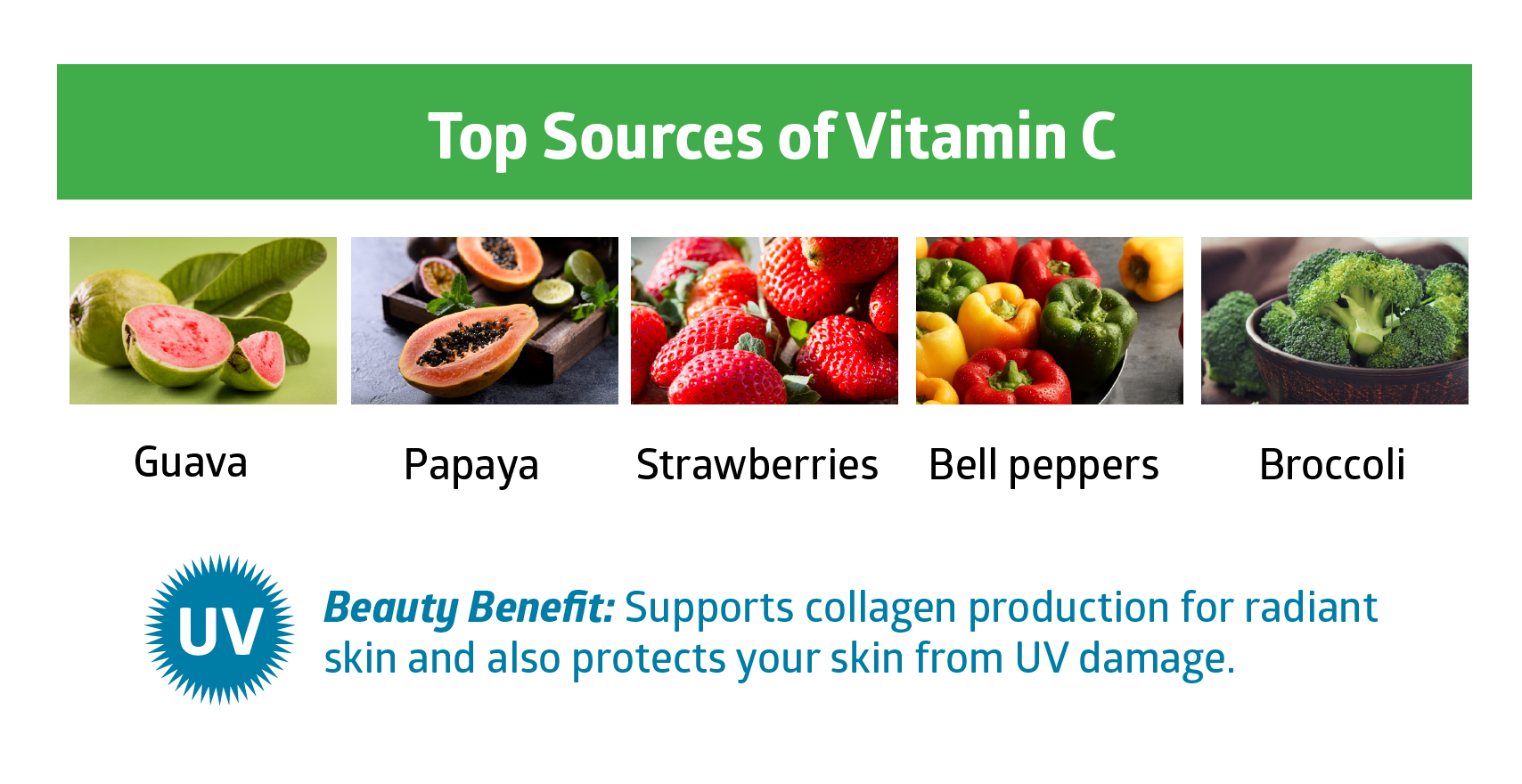
The best sources of vitamin C are plant-based. Especially citrus fruits. But other top sources include:
- Guava
- Papaya
- Strawberries
- Bell peppers
- Broccoli
Calcium
What is it?
Calcium is the most abundant mineral in your body. And you already know that calcium is essential for strong, healthy bones. But did you know calcium helps to keep your skin looking fresh and youthful too?
How is it beneficial to beauty?
Calcium aids your skin in 2 ways:
- It keeps your skin fresh: Your skin bears the brunt of daily life. So your body continually replaces your skin cells to keep your skin effective and fresh. And calcium, stored in the epidermis, affects how quickly this process happens. So more calcium = more new skin!
- It helps provide the structure for skin: Researchers have discovered that sagging, wrinkled skin in the face is related to bone structure. The bones are the foundation for building skin, so shrunken, and weaker bones inevitably lead to deteriorating skin. And that’s where calcium comes in. Calcium (amongst other things) is essential for strong bones. So when you get enough calcium, you’re helping your bones stay strong and support your skin.
You can read even more about calcium and beautiful skin in our “Calcium for Healthy Skin” page.
What are the best sources?
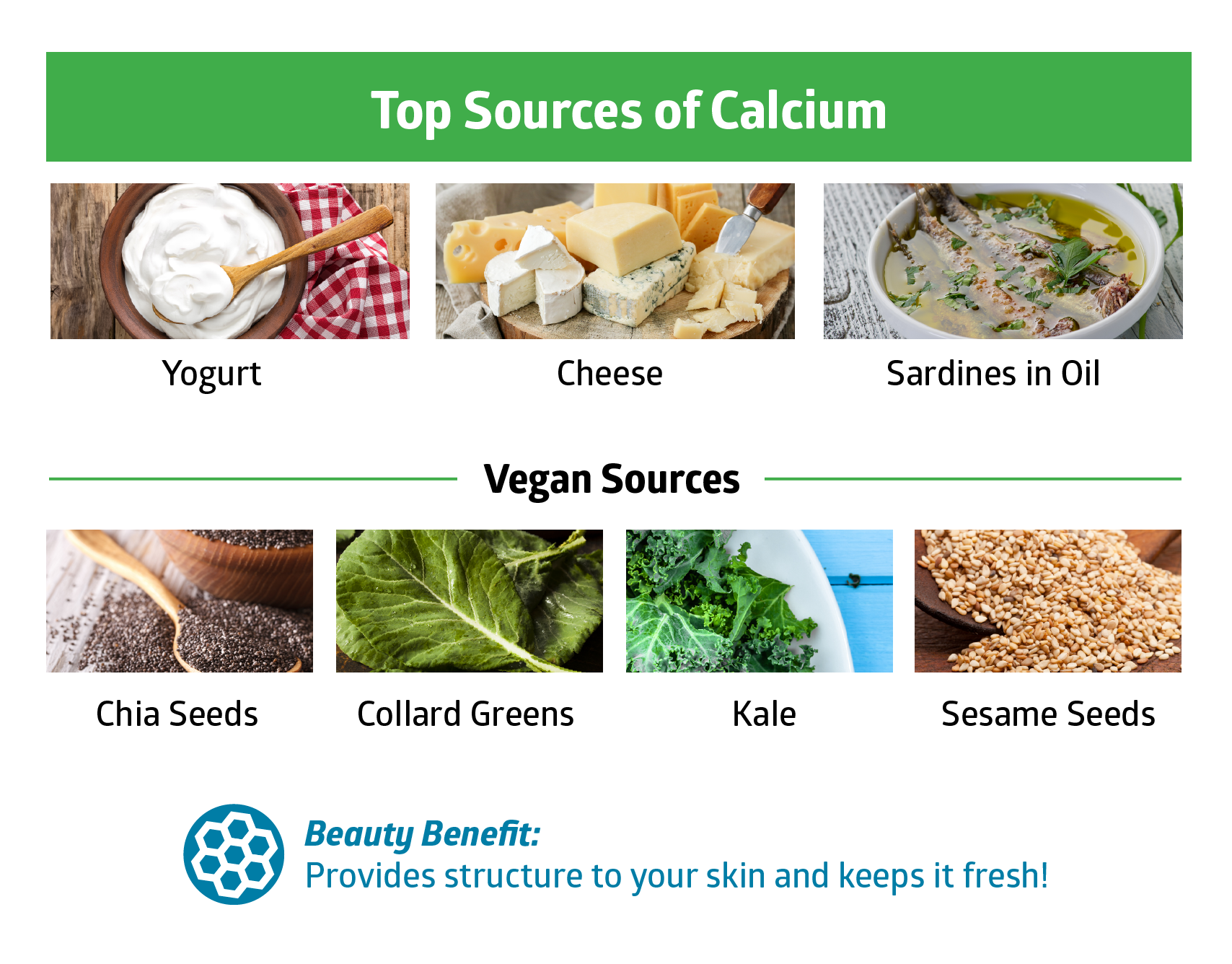
Cheese, sesame seeds, and milk are all great sources of calcium. But there are many other options. Read all about the best plant and animal sources of calcium in our post, “The Top Calcium-Rich Foods.”
Whole-Body Beauty Takeaways
So there you have it, eight vitamins and minerals that offer you beauty benefits! And remember, while the external effects are obviously a plus, these vitamins and minerals go above and beyond superficiality…
…They support your overall health. And that includes your bones.
Many of the entries on the list have antioxidant and/or anti-inflammatory properties. And that means that they protect your cells from oxidative stress and aging, and help protect you from a whole host of inflammation-based diseases. Including osteoporosis.
So if you don’t include these eight vitamins and minerals in your diet for beauty purposes, include them for your overall health!
Do you have any favorite vitamins and minerals for beauty? We’d love to hear about them in the comments section below.
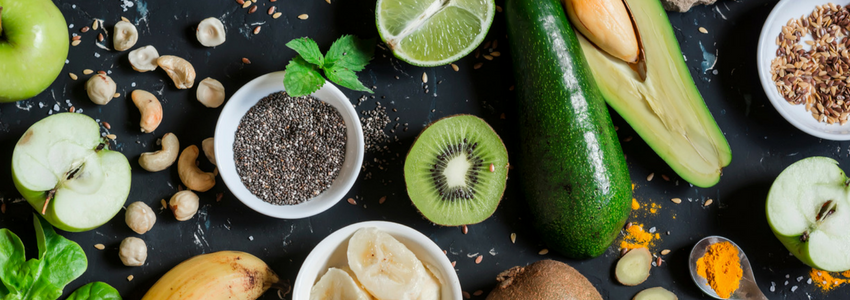




Sarah Cummings
July 24, 2018 , 10:50 pmIt is true that “True beauty comes from within”. The article shows that someone can be beautiful inside and out with the right food to intake and the consciousness of knowing the content of the what you are taking. Someone can start inside and the effect from within and outward will be on its way.